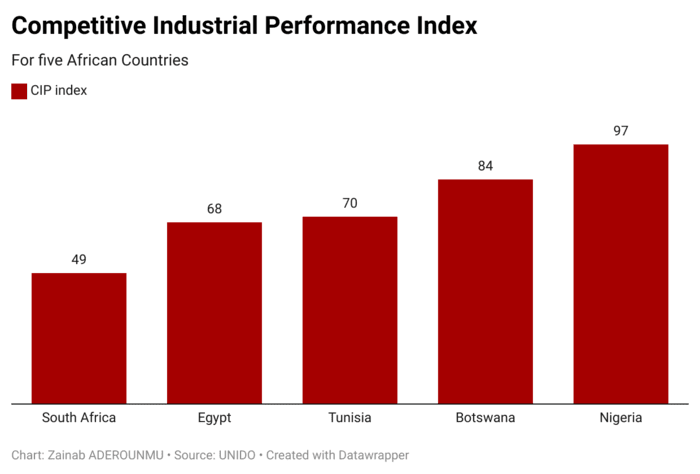Nigeria ranked 97 out of 153 international locations in 2023 on the Aggressive Industrial Efficiency Index, partly due to the federal government’s international change (FX) entry restrictions and import bans, in accordance with the World Financial institution.
This was revealed in its newest Nigeria Improvement Replace for December 2023, titled ‘Turning the nook: From reforms & renewed Hope’. The report produced biannually assesses quick financial developments and prospects in Nigeria.
“Whereas the FX restrictions didn’t explicitly prohibit importing the 43 classes of products on the restriction listing, they created a big hurdle. Since importers couldn’t receive FX by means of official channels to cowl the price of their imports, they turned to the costlier parallel markets and resorted to smuggling the imported merchandise into the nation,” the report stated.
“Partly due to these restrictions, Nigeria ranked 97 out of 153 international locations in 2023 on the Aggressive Industrial Efficiency Index, 44 locations beneath South Africa (ranked 53),” it acknowledged.
On 23 June 2015, the CBN prohibited 40 gadgets, later 43, from accessing international change within the Nigerian market, together with rice, cement, and so on. In a round launched by the Central Financial institution of Nigeria, the restrictions pushed importers into the parallel market, rising demand for international change and costs.
Further pressures widened the hole between the parallel market and the official fee and brought about the costs of affected items to rise. The European Union acknowledged that the measure had important penalties on the financial system and folks’s way of life.
Financial analysts speculated that limiting international change entry widened the hole between the parallel market and the traders and exporters window, and diminished the GDP.
“This hole signifies that traders can’t make investments. They need to import capital at an official fee and are pressured to function on market situations, which erodes their revenue and funding. No funding means diminished productiveness and diminished disposable revenue; the GDP suffers, and folks’s high quality of life drops,” stated Fadeelah Abiru, financial analyst at Marble Capital.
The Aggressive Industrial Efficiency Index, produced by the United Nations Industrial Improvement Group, ranks about 150 international locations and economies in accordance with their efficiency. It includes indicators benchmarking international locations’ potential to provide and export merchandise competitively.
The three Aggressive Industrial Index dimensions are the capability to provide and export manufactures, technological deepening and upgrading, and world affect. Nigeria dropped two locations in 2023 after rating 95 in 2021.
Specialists say that international traders will contemplate different international locations with a extremely aggressive index for his or her investments.
“This informs that South Africa’s aggressive industrial setting permits companies to thrive than in Nigeria, which can create sentiments for international traders as they contemplate South Africa a safer haven to allocate their assets”, Olayinka Lamidi, Researcher at African Plus Companions, stated.
“Furthermore, a extra aggressive industrial setting would create extra jobs and spur innovation to drive financial progress. Whereas that is probably to enhance the nation’s commerce steadiness, it will additionally assist the nation negotiate beneficial commerce agreements”, he added.
The United Nations Industrial Improvement stated that the competitiveness of the manufacturing business is without doubt one of the fundamental determinants of the long-term sustainable progress of a nation and can be utilized as a device to design and assess insurance policies.
Specialists comment that the commercial rating reveals that Nigeria’s restrictions on FX had been ineffective.
“For the restriction of FX to achieve success, sure situations needs to be in place. There was no level in it when native manufacturing wasn’t supported. Are folks patronizing domestically produced items?” Agiri Ibrahim, financial professional stated.
“Limiting FX with out placing these measures in place is like constructing a home with no basis,” he stated.


